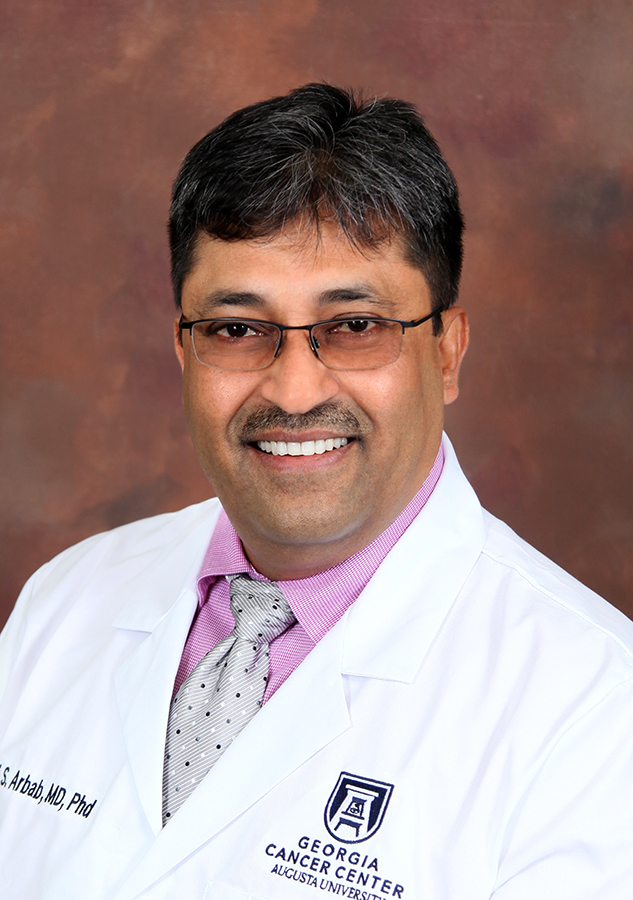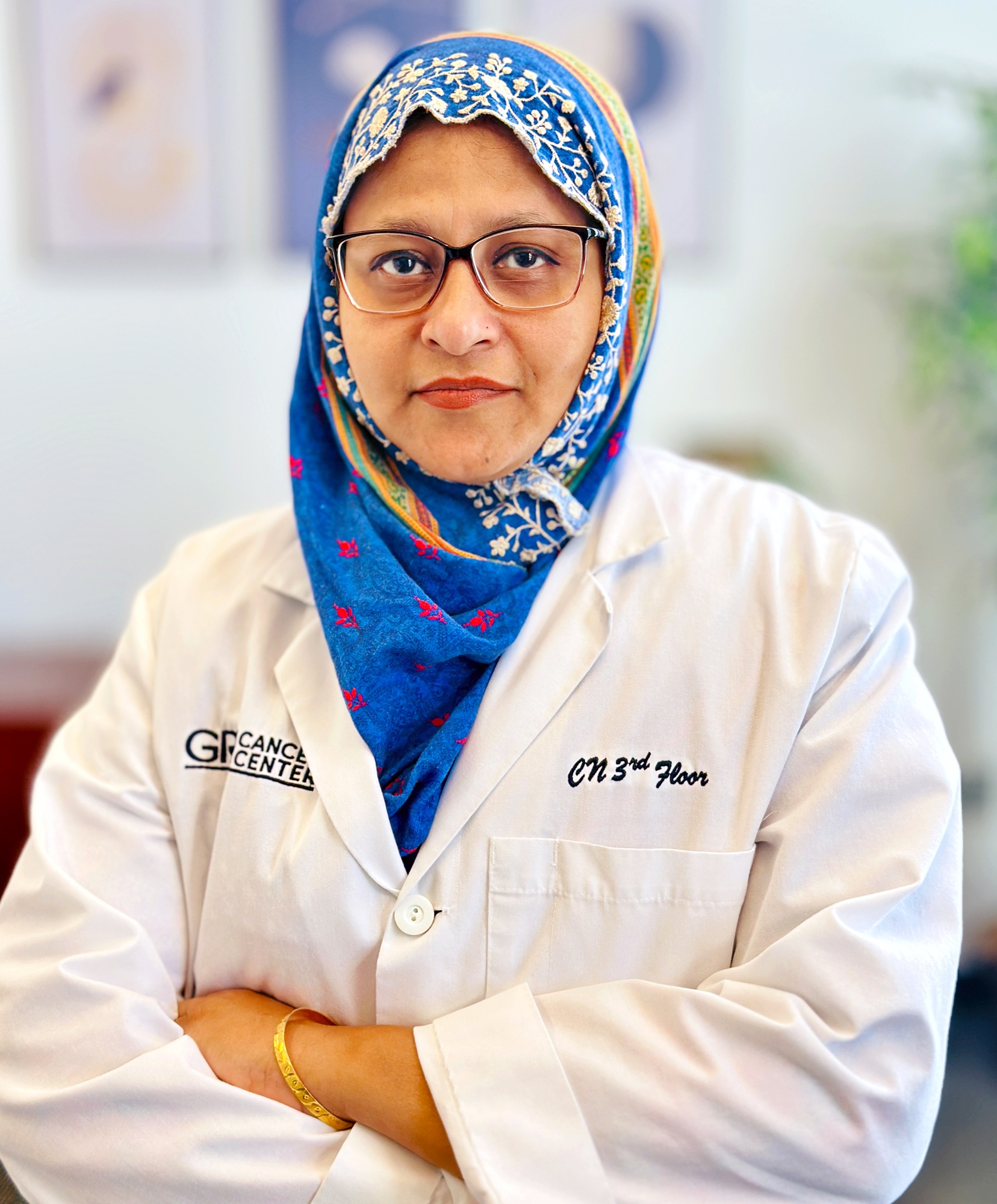
- Augusta University
- Georgia Cancer Center
- Research
- GCC Faculty Directory
- The Arbab Laboratory
The Arbab Laboratory
 Ali Arbab, MD, PhD
Ali Arbab, MD, PhD
Professor, Biochemistry and Molecular Biology
Member, Tumor Signaling and Angiogenesis
Research Summary
Our laboratory is devoted to determining the mechanisms of therapy resistance by focusing on the involvement of bone marrow-derived cells in modulating the tumor microenvironment (TME) and initiating tumor neovascularization in glioblastoma and breast cancer models. Transgenic, chimeric, and wild type (syngeneic and immunocompromised) animals are being used to determine the involvement of bone marrow cells in the TME. Our group documented that tumor-recruited bone marrow cells are a predominantly heterogeneous myeloid cell population that can predict therapeutic response in cancer. Therefore, we are using several strategies to target myeloid cells in the TME using nanonized drugs or engineered therapeutic exosomes to potentiate the anti-tumor effect of FDA-approved drugs in preclinical models of glioblastoma and breast cancer. Besides, our group has successfully tested the IV formulation of the new drug HET0016 for the treatment of glioblastoma and breast cancers.
In addition to the tumor cell-extrinsic mechanisms, tumor intrinsic mechanisms such as vascular mimicry are being actively investigated in our laboratory. Tumor cells, under the influence of therapeutic drugs and hypoxia, acquire endothelial cell-like characteristics through a mesenchymal cell state to enhance tumor vasculature and therapy resistance to cause a relapse. We have identified a possible pathway that governs the transdifferentiation of tumor cells to make their own blood-supplying channels in the case of AAT-induced hypoxia. Our group also identified that following anti-angiogenic treatment there is the nuclear translocation of VEGFR2 in glioma.
Contact Us
The Ali Arbab Lab
Health Sciences Campus
GCC - M. Bert Storey Research Building
1410 Laney Walker Blvd., CN3144B3
(706) 721-
8909 (Office)
(706) 721-4375 (Lab)
Research Interests
- Understanding the mechanisms of resistant to antiangiogenic treatment in glioma
- In vivo detection of involvement of endogenous BM progenitor cells in glioma
- Incidence of vascular mimicry in tumor neovascularization before and after anti-angiogenic treatments
- Involvement of MDSCs in making alternative neovascularization in glioma
- Primary and metastatic niche directed treatment in breast cancer
- Modulation of tumor microenvironment using engineered nanoparticles, exosomes, and stem cells
- Targeted delivery of exosomes and making of engineered exosomes for imaging and therapy
- Focal ultrasound mediated delivery of exosomes in stroke
Selected Publications
Experimental study of processing of PCL (polycaprolactone)-peptides nanoparticles
and its biodistribution analysis for drug delivery system
M Khan, A Yamasta, M Parvin, J Ferdaus, H Ahmed, AS Arbab
Micro and Nano Systems Letters 12 (1), 18
Single episode of moderate to severe traumatic brain injury leads to chronic neurological
deficits and Alzheimer’s-like pathological dementia
K Vaibhav, M Gulhane, P Ahluwalia, M Kumar, M Ahluwalia, AM Rafiq, ...
GeroScience, 1-19
Altering biomolecular condensates as a potential mechanism that mediates cannabidiol
effect on glioblastoma
LP Wang, PS Chagas, ÉL Salles, SE Naeini, J Gouron, HM Rogers, ...
Medical Oncology 41 (6), 140
Exercise improves cerebral blood flow and functional outcomes in an experimental mouse
model of vascular cognitive impairment and dementia (VCID)
MB Khan, H Alam, S Siddiqui, MF Shaikh, A Sharma, A Rehman, B Baban, ...
Translational Stroke Research 15 (2), 446-461
Isolation and immunosuppressive functions of myeloid-derived suppressor cell-derived
exosomes
M Parvin, MH Rashid, AS Arbab
Methods in cell biology 184, 105
Time Dimension Influences Severity of Stroke and Heightened Immune Response in Mice
PK Kamat, MB Khan, S Siddiqui, D Williams, E da Silva Lopes Salles, ...
Translational Stroke Research, 1-17
Inhalant cannabidiol inhibits glioblastoma progression through regulation of tumor
microenvironment
H Khodadadi, ÉL Salles, A Alptekin, D Mehrabian, M Rutkowski, ...
Cannabis and Cannabinoid Research 8 (5), 824-834
A multi-laboratory preclinical trial in rodents to assess treatment candidates for
acute ischemic stroke
PD Lyden, MA Diniz, F Bosetti, J Lamb, KA Nagarkatti, A Rogatko, S Kim, ...
Science translational medicine 15 (714), eadg8656
Co-axial electrospraying of injectable multi-cancer drugs nanocapsules with polymer
shells for targeting aggressive breast cancers
M Khan, MM Hasan, A Barnett, R Piranlioglu, M Rashid, A Alptekin, ...
Cancer Nanotechnology 13 (1), 6
Engineered exosomes for studies in tumor immunology
A Alptekin, M Parvin, HI Chowdhury, MH Rashid, AS Arbab
Immunological reviews 312 (1), 76-102
Viral particle-mediated SAMHD1 depletion sensitizes refractory glioblastoma to DNA-damaging
therapeutics by impairing homologous recombination
W Daddacha, D Monroe, K Carver, ER Usoro, A Alptekin, H Xu, S Osuka, ...
Cancers 14 (18), 4490
Research Team

